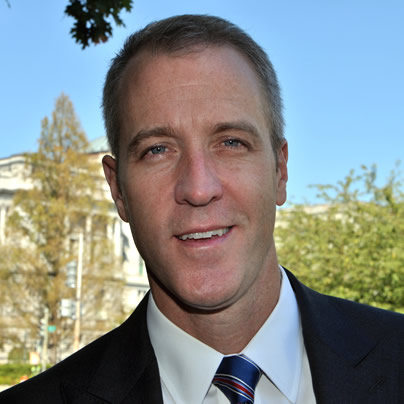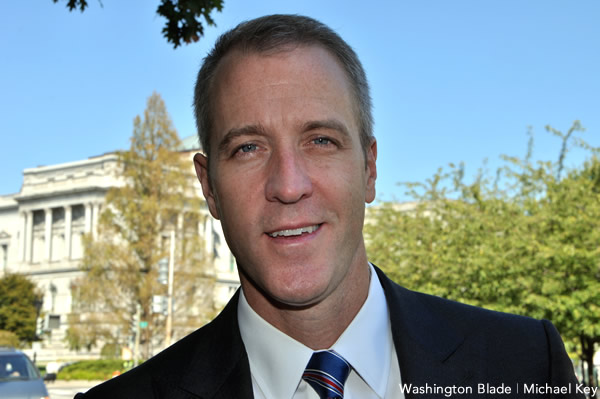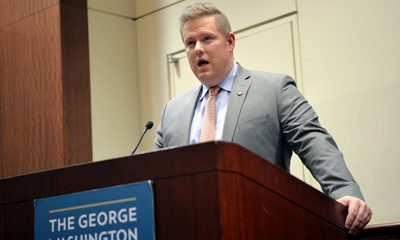National
Gay New Yorker in tight race with GOP incumbent
Maloney seeks to oust Hayworth; race a ‘tossup’

Sean Patrick Maloney has ambitious goals for someone in a tight race seeking his first term in Congress. His priorities upon taking office would be “getting Congress working for people who need it working in their lives.”
“I think the most important thing right now is that too many voices aren’t being heard in Congress — the middle class, working people and people who care about equality, care about a future where we all count, we all work together,” Maloney said.
He’s seeking to unseat freshman Rep. Nan Hayworth (R-N.Y.) to represent New York’s 18th congressional district.
Maloney, who if elected would be the first openly gay member of Congress from New York, touted his previous work in Washington. He was a senior West Wing adviser in the Clinton administration and was first deputy secretary for former New York Gov. Eliot Spitzer.
“I know my way around Washington, and I’ve spent years working on different types of policies and partnerships in people in state government, people in local government, with the private sector,” Maloney said. “And so, I think I bring a set of relationships to the job that is unique for a freshman member, and a degree of experience in how Washington works when it’s working well.”
While he acknowledged the importance of having a Democratic majority in the U.S. House that “cares about LGBT people,” Maloney said he sees an opportunity for passage of pro-LGBT legislation even if Republicans remain in power — provided what he called the “extreme wing” of the party isn’t in control.
Maloney said New York could serve as an example because marriage equality legislation was passed in a Republican-controlled Senate under the leadership of Gov. Andrew Cuomo. The House candidate took credit for helping draft the New York marriage equality bill under the Spitzer administration, but said he wasn’t involved in the process of moving the law through in 2011.
“New York is the example,” Maloney said. “New York is where Democrats and Republicans have figured out how to work together on issues of LGBT equality. We don’t — look, you’ll never get everybody, but I do believe the day is coming when moderate voices, people who care about equality within the Republican Party will begin working with those of us who have been fighting for years on these issues.”
National LGBT groups are backing Maloney in pursuit of his U.S. House seat, including the Human Rights Campaign and the Gay & Lesbian Victory Fund.
Michael Cole-Schwartz, a spokesperson for the Human Rights Campaign, said his organization is working to help Maloney win.
“Sean Patrick Maloney is a wonderful candidate and will be a tremendous leader in the House,” Cole-Schwartz said. “HRC is committed to helping him win and we’re encouraging our members to support his campaign through our candidate fundraising tool at www.hrc.org/candidates.”
Maloney said he supports pro-LGBT legislation that Congress has yet to pass — including the Uniting American Families Act and the Employment Non-Discrimination Act — in addition to repeal of the Defense of the Marriage Act.
“I think a lot of us hope that the Supreme Court will establish as it did in the area of interracial marriage that denying equal marriage rights to same-sex couple is a violation of the federal Constitution as applied to the states, and so you’ll get a national constitution grounding for marriage,” Maloney said. “But Congress certainly has a role to play. We absolutely should repeal DOMA.”
Maloney also called on President Obama to revisit the idea of issuing an executive order that would bar federal contractors from discriminating in the workplace against LGBT people, saying the White House announcement in April that the order wouldn’t happen at this time “was a mistake.”
“I was disappointed that the White House made that decision,” Maloney said. “And I say that as someone who gives the president a great deal of credit for the position he took on marriage, which was historic, and for putting marriage equality front and center at the Democratic National Convention.”
Maloney lives in Cold Springs, N.Y. He has been with his partner, Randy Florke, a Realtor, since 1992 and they have three children: Jesús, Daley, and Essie. They also have homes in Sullivan County and New York City.
The contest to represent New York’s 18th congressional district is tight. Polls in recent weeks have showed Maloney running even with Hayworth, or slightly behind. A Public Policy Polling survey published Sept. 21 found Maloney and Hayworth both receiving 43 percent of support, while 14 percent were undecided.
Jessica Taylor, a senior analyst for the Rothenberg Political Report, ranked the race as a “pure toss-up” because even though being an incumbent would give her an advantage, Hayworth won her seat in a good Republican year, and the district is generally Democratic and would probably see more Democratic turnout in the presidential election.
“I think it’s going to be a really close battle,” Taylor said. “Her first ad against Maloney hits him on how he just moved into the district. I think that could be an effective strategy, but also, this is not a new thing for New York — people first living in the city and moving out to the suburban areas.”
During the Blade interview, Maloney criticized Hayworth, calling her “one of the most extreme members of Congress” and saying she’s “out of step with her district” for supporting legislation put forward by House Republican leaders.
“She wants to end Medicare and give massive tax cuts to multi-millionaires like herself,” Maloney said. “She wants to defund Planned Parenthood. She wants to deny women access to contraception. … On issue after issue that is important to LGBT equality, that is important to the middle class that is important to women’s rights and women’s health, she has been an extreme conservative.”
But Hayworth has a fairly good record on LGBT issues during her first term in Congress. A member of the LGBT Equality Caucus, Hayworth voted against three amendments on the House floor that reaffirmed the Defense of Marriage Act. She’s also a co-sponsor of ENDA and the Domestic Partner Tax Parity Act, which would end the tax penalty by individuals who receive health insurance for their partners from their employers.
R. Clarke Cooper, executive director of the Log Cabin Republicans, praised Hayworth’s action on LGBT issues upon taking her House seat. The organization as of Tuesday hasn’t endorsed Hayworth.
“When Nan Hayworth came to Congress as a freshman in 2011, she quickly distinguished herself by becoming Deputy Majority Whip and joining the bi-partisan LGBT Equality Caucus,” Cooper said. “Her active presence among her peers in the House and within the House Republican leadership is critical to advancing equality, restoring fiscal discipline and maintaining a majority in the Congress.”
Hayworth has a gay son, Will Hayworth, who lives in D.C. According to his website, he studied economics and computer science at Bard College and has experience as a research intern covering monetary policy at libertarian think-tank called the Cato Institute. He identifies as “a registered Republican with very, very libertarian leanings.”
But Maloney was unimpressed with Hayworth’s actions and called on her to articulate her position on marriage equality — which he said 60 percent of his district supports — and say whether she wants to repeal DOMA.
“It’s real simple,” Maloney said. “All she has to do is say she supports marriage equality and repeal of DOMA. She won’t. So, talk is cheap, procedural votes are cheap. When the rubber meets the road, she is not our friend. She is terrible on LGBT equality and I’ve been working on these issues for 20 years of my life. So, I would invite her to — and you should ask her — does she support marriage equality? Will she support the repeal of DOMA? She won’t. I will. That’s the choice.”
The Blade attempted to speak with the Republican lawmaker during the Log Cabin’s “Spirit of Lincoln” awards dinner in D.C. on Sept. 20 — which she attended with her son Will Hayworth — about her position on marriage equality and DOMA, but she refused to take questions. Requests to comment for this article weren’t returned by Hayworth’s campaign or her office.
Maloney said he’s aware Hayworth has a gay son. Asked whether that heightens the need for her to address her positions on LGBT issues, Maloney replied, “All that we have is her record, and she will not say that she supports marriage equality and she will not support the repeal of DOMA. Why she believes that, what she really believes, you’ll have to ask her. I’m not qualified to speak to anything other than what her record is as a member of Congress. And her record is terrible for the most important issue for our community: She is not our friend on marriage equality.”
Federal Government
Lambda Legal praises Biden-Harris administration’s finalized Title IX regulations
New rules to take effect Aug. 1

The Biden-Harris administration’s revised Title IX policy “protects LGBTQ+ students from discrimination and other abuse,” Lambda Legal said in a statement praising the U.S. Department of Education’s issuance of the final rule on Friday.
Slated to take effect on Aug. 1, the new regulations constitute an expansion of the 1972 Title IX civil rights law, which prohibits sex-based discrimination in education programs that receive federal funding.
Pursuant to the U.S. Supreme Court’s ruling in the landmark 2020 Bostock v. Clayton County case, the department’s revised policy clarifies that discrimination on the basis of sexual orientation and gender identity constitutes sex-based discrimination as defined under the law.
“These regulations make it crystal clear that everyone can access schools that are safe, welcoming and that respect their rights,” Education Secretary Miguel Cardona said during a call with reporters on Thursday.
While the new rule does not provide guidance on whether schools must allow transgender students to play on sports teams corresponding with their gender identity to comply with Title IX, the question is addressed in a separate rule proposed by the agency in April.
The administration’s new policy also reverses some Trump-era Title IX rules governing how schools must respond to reports of sexual harassment and sexual assault, which were widely seen as imbalanced in favor of the accused.
Jennifer Klein, the director of the White House Gender Policy Council, said during Thursday’s call that the department sought to strike a balance with respect to these issues, “reaffirming our longstanding commitment to fundamental fairness.”
“We applaud the Biden administration’s action to rescind the legally unsound, cruel, and dangerous sexual harassment and assault rule of the previous administration,” Lambda Legal Nonbinary and Transgender Rights Project Director Sasha Buchert said in the group’s statement on Friday.
“Today’s rule instead appropriately underscores that Title IX’s civil rights protections clearly cover LGBTQ+ students, as well as survivors and pregnant and parenting students across race and gender identity,” she said. “Schools must be places where students can learn and thrive free of harassment, discrimination, and other abuse.”
Michigan
Mich. Democrats spar over LGBTQ-inclusive hate crimes law
Lawmakers disagree on just what kind of statute to pass

Michigan could soon become the latest state to pass an LGBTQ-inclusive hate crime law, but the state’s Democratic lawmakers disagree on just what kind of law they should pass.
Currently, Michigan’s Ethnic Intimidation Act only offers limited protections to victims of crime motivated by their “race, color, religion, gender, or national origin.” Bills proposed by Democratic lawmakers expand the list to include “actual or perceived race, color, religion, gender, sexual orientation, gender identity or expression, ethnicity, physical or mental disability, age, national origin, or association or affiliation with any such individuals.”
Democratic Gov. Gretchen Whitmer and Attorney General Dana Nessel have both advocated for a hate crime law, but house and senate Democrats have each passed different hate crimes packages, and Nessel has blasted both as being too weak.
Under the house proposal that passed last year (House Bill 4474), a first offense would be punishable with a $2,000 fine, up to two years in prison, or both. Penalties double for a second offense, and if a gun or other dangerous weapons is involved, the maximum penalty is six years in prison and a fine of $7,500.
But that proposal stalled when it reached the senate, after far-right news outlets and Fox News reported misinformation that the bill only protected LGBTQ people and would make misgendering a trans person a crime. State Rep. Noah Arbit, the bill’s sponsor, was also made the subject of a recall effort, which ultimately failed.
Arbit submitted a new version of the bill (House Bill 5288) that added sections clarifying that misgendering a person, “intentionally or unintentionally” is not a hate crime, although the latest version (House Bill 5400) of the bill omits this language.
That bill has since stalled in a house committee, in part because the Democrats lost their house majority last November, when two Democratic representatives resigned after being elected mayors. The Democrats regained their house majority last night by winning two special elections.
Meanwhile, the senate passed a different package of hate crime bills sponsored by state Sen. Sylvia Santana (Senate Bill 600) in March that includes much lighter sentences, as well as a clause ensuring that misgendering a person is not a hate crime.
Under the senate bill, if the first offense is only a threat, it would be a misdemeanor punishable by one year in prison and up to $1,000 fine. A subsequent offense or first violent hate crime, including stalking, would be a felony that attracts double the punishment.
Multiple calls and emails from the Washington Blade to both Arbit and Santana requesting comment on the bills for this story went unanswered.
The attorney general’s office sent a statement to the Blade supporting stronger hate crime legislation.
“As a career prosecutor, [Nessel] has seen firsthand how the state’s weak Ethnic Intimidation Act (not updated since the late 1980’s) does not allow for meaningful law enforcement and court intervention before threats become violent and deadly, nor does it consider significant bases for bias. It is our hope that the legislature will pass robust, much-needed updates to this statute,” the statement says.
But Nessel, who has herself been the victim of racially motivated threats, has also blasted all of the bills presented by Democrats as not going far enough.
“Two years is nothing … Why not just give them a parking ticket?” Nessel told Bridge Michigan.
Nessel blames a bizarre alliance far-right and far-left forces that have doomed tougher laws.
“You have this confluence of forces on the far right … this insistence that the First Amendment protects this language, or that the Second Amendment protects the ability to possess firearms under almost any and all circumstances,” Nessel said. “But then you also have the far left that argues basically no one should go to jail or prison for any offense ever.”
The legislature did manage to pass an “institutional desecration” law last year that penalizes hate-motivated vandalism to churches, schools, museums, and community centers, and is LGBTQ-inclusive.
According to data from the U.S. Department of Justice, reported hate crime incidents have been skyrocketing, with attacks motivated by sexual orientation surging by 70 percent from 2020 to 2022, the last year for which data is available.
Twenty-two states, D.C., Puerto Rico, and the U.S. Virgin Islands have passed LGBTQ-inclusive hate crime laws. Another 11 states have hate crime laws that include protections for “sexual orientation” but not “gender identity.”
Michigan Democrats have advanced several key LGBTQ rights priorities since they took unified control of the legislature in 2023. A long-stalled comprehensive anti-discrimination law was passed last year, as did a conversion therapy ban. Last month the legislature updated family law to make surrogacy easier for all couples, including same-sex couples.
A bill to ban the “gay panic” defense has passed the state house and was due for a Senate committee hearing on Wednesday.
Indiana
Drag queen announces run for mayor of Ind. city
Branden Blaettne seeking Fort Wayne’s top office

In a Facebook post Tuesday, a local drag personality announced he was running for the office of mayor once held by the late Fort Wayne Mayor Tom Henry, who died last month just a few months into his fifth term.
Henry was recently diagnosed with late-stage stomach cancer and experienced an emergency that landed him in hospice care. He died shortly after.
WPTA, a local television station, reported that Fort Wayne resident Branden Blaettne, whose drag name is Della Licious, confirmed he filed paperwork to be one of the candidates seeking to finish out the fifth term of the late mayor.
Blaettner, who is a community organizer, told WPTA he doesn’t want to “get Fort Wayne back on track,” but rather keep the momentum started by Henry going while giving a platform to the disenfranchised groups in the community. Blaettner said he doesn’t think his local fame as a drag queen will hold him back.
“It’s easy to have a platform when you wear platform heels,” Blaettner told WPTA. “The status quo has left a lot of people out in the cold — both figuratively and literally,” Blaettner added.

The Indiana Capital Chronicle reported that state Rep. Phil GiaQuinta, who has led the Indiana House Democratic caucus since 2018, has added his name to a growing list of Fort Wayne politicos who want to be the city’s next mayor. A caucus of precinct committee persons will choose the new mayor.
According to the Fort Wayne Journal Gazette, the deadline for residents to file candidacy was 10:30 a.m. on Wednesday. A town hall with the candidates is scheduled for 6 p.m. on Thursday at Franklin School Park. The caucus is set for 10:30 a.m. on April 20 at the Lincoln Financial Event Center at Parkview Field.
At least six candidates so far have announced they will run in the caucus. They include Branden Blaettne, GiaQuinta, City Councilwoman Michelle Chambers, City Councilwoman Sharon Tucker, former city- and county-council candidate Palermo Galindo, and 2023 Democratic primary mayoral candidate Jorge Fernandez.
-

 Africa5 days ago
Africa5 days agoCongolese lawmaker introduces anti-homosexuality bill
-

 District of Columbia2 days ago
District of Columbia2 days agoReenactment of first gay rights picket at White House draws interest of tourists
-

 District of Columbia1 day ago
District of Columbia1 day agoNew D.C. LGBTQ+ bar Crush set to open April 19
-

 World5 days ago
World5 days agoOut in the World: LGBTQ news from Europe and Asia















